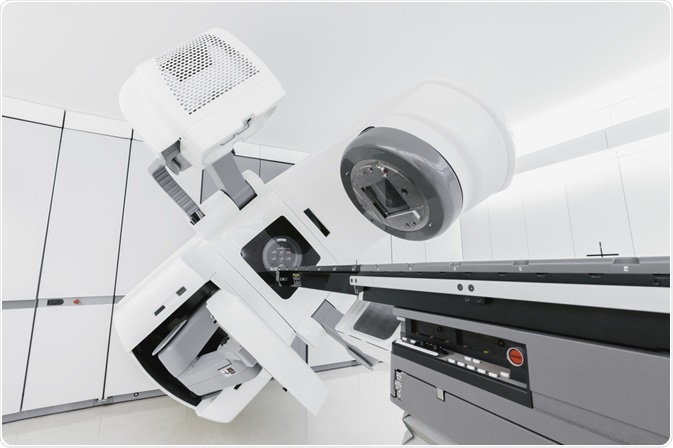Rheumatoid arthritis is a health condition that involves inflammation of the joint capsule, a condition that is referred to as synovitis, that can cause severe pain. Traditional treatments include non-steroidal anti-inflammatory drugs (NSAIDs) and corticosteroid injections into the affected joint. More recently, disease-modifying antirheumatic drugs (DMARDs) have also been introduced as a treatment with positive results.
Radiotherapy has been proposed as an alternative treatment option for advanced disease in patients who do not experience significant improvement or are affected by adverse effects of other treatments. The efficacy of radiotherapy as a treatment for rheumatoid arthritis is still being established, however, with scientific research showing varied results.

Image Credit: Thomas Hecker / Shutterstock.com
Radiosynoviorthesis procedure
Radiosynoviorthesis is a therapy involving the injection of radioactive fluid into the affected synovial joint capsule where it is trapped. This causes fibrosis in the area that destroys the inflamed and damaged collagen, which then regrows in a healthier manner. As the procedure is relatively invasive, it should be reserved for severe cases that are not relieved by other therapies.
The radiopharmaceutical colloidal erbium-169-citrate is often used, which is slow acting and can take several months to treat the damaged cartilage that surrounds the joint. The pain relief and improvement in symptoms can take up to six months to become evident.
Radiofrequency Ablation for Arthritis Knee Pain
Supporting scientific research
The first scientific research supporting the value of radiotherapy in the treatment of rheumatoid arthritis arose early in the twenty-first century, despite the therapy being used in patients in a clinical setting for several decades previously.
One study in 2003 of 29 patients found that about two-thirds of the joints were classed as a long-term clinical success when treated with radiosynoviorthesis. These patients reported significant pain relief that continued throughout a follow-up period of, on average, 3.5 years. Based on this study, medical researchers suggested that radiosynoviorthesis should be considered as a viable treatment option for rheumatoid arthritis.
In this study, not all affected joints improved and some areas were more responsive than others. For example, the majority of the thumb base and proximal interphalangeal joints improved. Comparatively, distal interphalangeal and metacarpophalangeal joints tended to show less improvement.
However, successive research studies had conflicting results about the efficacy of radiotherapy in rheumatoid arthritis. Shortly after in 2004, a pilot study did not find the therapy to be effective.
To date, the place of radiotherapy in the treatment of rheumatoid arthritis is not known. It is not routinely recommended as a treatment option but may be successful in some patients, particularly those with severe disease and symptoms.
Radiotherapy for cancer patients with rheumatoid arthritis
There has also been some concern about the use of radiotherapy to treat other health conditions, such as cancer, in patients with rheumatoid arthritis and other autoimmune diseases.
However, there is little evidence to support the restriction of radiotherapy in these patients. Some research has indicated a higher frequency of complications such as intestinal perforation, which likely results from the long-term effects of medications often used in rheumatoid arthritis. Therefore, the benefits and risks of radiotherapy treatment for patients with rheumatoid arthritis should be considered for the appropriate treatment decisions to be made.
References
Further Reading
Last Updated: Oct 28, 2022